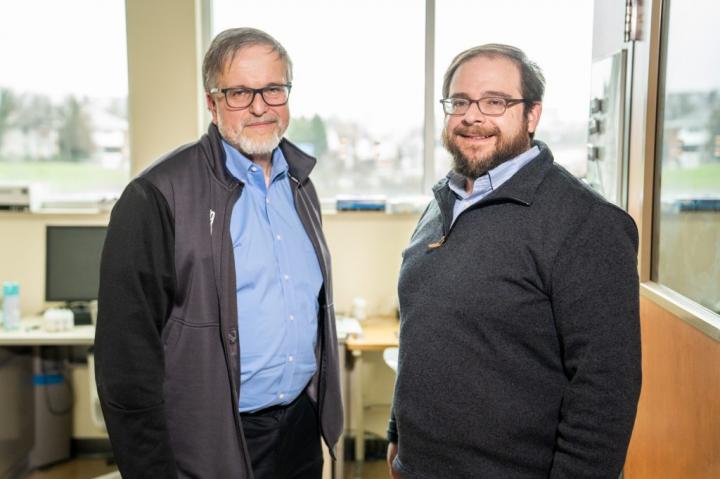
Credit: Virginia Tech
People with alcohol use disorder know that when it comes to immediate satisfaction, nothing works quicker than liquor.
New ways to help people resist the siren call of alcohol have not kept pace — which leaves health care providers stuck with the same intervention and rehabilitation options they have had for decades.
But now, Virginia Tech scientists are studying whether people battling alcohol use disorder might gain some relief by “pre-experiencing” the future. The research is supported by a new $3.45 million grant from the National Institute on Alcohol Abuse and Alcoholism of the National Institutes of Health.
Principal investigators are Warren Bickel, a professor at the Fralin Biomedical Research Institute at VTC, and Stephen LaConte, an associate professor at the Fralin Biomedical Research Institute and an expert in advanced neuroimaging.
“People who have problems with alcohol have a decision-making process focused on immediate outcomes, and they make choices that aren’t very healthy for them,” said Bickel, who is also the director of the institute’s Addiction Recovery Research Center. “When time is short, reinforcers, such as alcohol, that offer brief, intense, and reliable rewards have greater value. Instead, we want to explore ways for people to mentally construct how they will feel at future events, and this lowers the value they place on alcohol.”
Using behavioral analysis, an in-laboratory drinking situation, neuroimaging, and computational modeling, the new approach dives right into efforts to understand the decision-making of alcohol use and abuse.
Study volunteers will belly up to an experimental bar, where they “self-administer” alcohol. But it’s not exactly party time.
“We have safety limits,” said Bickel, who is also a professor of psychology in the College of Science. “There’s only a limited amount they can drink in our bar lab during the window of time that we give them. And, of course, study volunteers won’t be able to leave until they’re no longer affected by alcohol. These are long and demanding sessions.”
The researchers plan to engage research study volunteers with a new intervention that applies a reinforcer called episodic future thinking to get people to concretely think about future events that will influence their immediate decisions.
The study contains a multisite neuroimaging component, where LaConte, an associate professor in the Department of Biomedical Engineering and Mechanics in the College of Engineering, will oversee functional magnetic resonance imaging (fMRI) and particularly an innovative form of functional brain imaging called real-time fMRI, which LaConte has pioneered to further understand the events that occur in the brain during risky decision-making.
“A major focus of my lab centers on real-time fMRI, with research applications targeted at improving basic understanding of normal brain function as well as exploring the potential for rehabilitation and therapy for neurological and psychiatric conditions,” LaConte said. “I am extremely excited to serve as co-principal investigator with Dr. Bickel, and I am certain we will make advances. With a solid foundation in episodic future thinking interventions and my lab’s experimental and technical success with real-time fMRI, I am optimistic about our combined potential for future innovations and discovery.”
LaConte and Bickel will work with Samuel McClure, an associate professor of psychology at Arizona State University and director of its Decision Neuroscience Laboratory. McClure’s lab will relate neuroimaging findings to computational models of brain function and decision-making to describe decisions in terms of neural processes.
“Alcohol, food, sex, drugs, and gambling all have a relatively comparable profile — they are brief, intense, immediate, and reliable,” Bickel said. “But when people go down the addiction road, they give up things like employment, relationships, and education, which have a very different profile. Those things are lower intensity, variable in nature — you have good days and bad days at work, for example –and they accrue in value only if you invest in them over time.”
In a large time-frame, long-term behavior reinforcers, such as building relationships with loved ones, gain influence while the immediate value of alcohol reinforcement decreases.
In episodic future thinking, research volunteers describe upcoming events in their lives, and talk about what they are going to see, hear, feel, smell, and feel. Then, like a story, they put a title on it.
“We systematically use the titles they gave us as reminders,” Bickel said. “It opens up their door to the future. All of a sudden, things that at first had no relevance now have larger relevance. And in the process, how much they value their substance use drops.”
Bickel has seen this work before in research studies where scientists measured how much people normally drank during their daily activities and then introduced episodic future thinking to the mix.
“If someone said a month from now I’m going to go to my nephew’s birthday party, we would text them reminders, ‘Nephew’s Birthday Party,'” Bickel said. “It worked. People who were drinking an average of six beverages a day cut their consumption nearly in half, only because we were texting them with the titles they wrote for themselves during episodic future thinking.”
“We still have more to understand about the nature of alcohol use disorder and believe the results of our studies will positively impact public health,” Bickel said. “I feel very strongly that we are at the front edge of something important.”
###
Media Contact
John Pastor
[email protected]
540-526-2222
Original Source
https:/




